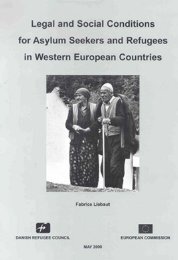I External aid
I External aid
I External aid
You also want an ePaper? Increase the reach of your titles
YUMPU automatically turns print PDFs into web optimized ePapers that Google loves.
ANNUAL REPORT ON THE IMPLEMENTATION OF THE EUROPEAN COMMISSION’S EXTERNAL ASSISTANCE<br />
ASSISTANCE TO CANDIDATE COUNTRIES:<br />
A SEPARATE ISSUE<br />
“The European Community also provided over €3 billion of<br />
assistance in 2000 to third countries who are candidates to<br />
the European Union. Assistance is allocated to priority areas<br />
indicated by the Commission in an "Accession Partnership"<br />
for each country, which is based on the weaknesses identified<br />
in the Commission's annual Regular Report on the preparations<br />
of the candidate country for accession.<br />
Nearly 95% of the assistance was directed to the ten candidate<br />
countries of Eastern and Central Europe through three<br />
pre-accession assistance programmes. Half of this amount<br />
is accounted for by Phare, which is managed by DG Enlargement,<br />
and is focused on helping the countries prepare to<br />
implement the acquis communautaire upon accession. One<br />
third is for Ispa, which is managed by DG Regional Policy,<br />
and is focused on major investments in the environment and<br />
transport sectors. One sixth is for Sapard, which is managed<br />
by DG Agriculture, and is focused on rural development and<br />
agriculture.<br />
About 5% of the assistance is allocated to Turkey and is currently<br />
implemented using the Meda Regulation. A new financial<br />
regulation for Turkey has been proposed by the Commission<br />
with a view to replacing financing from the three<br />
existing sources in 2002. Finally rather less than 1% of the<br />
total is allocated to Cyprus and Malta on the basis of a specific<br />
regulation. The assistance to Turkey, Cyprus and Malta<br />
is managed by DG Enlargement. It should be noted that these<br />
countries remain eligible for support from Meda horizontal<br />
projects in the context of the Barcelona process.<br />
For each pre-accession financial instrument the managing<br />
DG is responsible within the Commission for the whole project<br />
cycle from programming through implementation to evaluation.<br />
However it should be noted that these programmes<br />
are carried out on a highly decentralised basis with the candidate<br />
country itself directly responsible for managing project<br />
implementation (subject to some checking of tendering<br />
and contracting by Commission Delegations on-the-spot).<br />
2. Improving external<br />
<strong>aid</strong> management<br />
At the same time as defining new directions for the Community’s<br />
development policy, an ambitious reform of the way<br />
external <strong>aid</strong> is managed has been launched, aimed at improving<br />
project quality and cutting the time taken to implement<br />
them.<br />
A first step towards unification of the services tasked with executing<br />
the third country <strong>aid</strong> programmes, and towards improving<br />
management was the setting up, in 1998, of the Common<br />
Service for <strong>External</strong> Relations (SCR). The SCR set to work to eli-<br />
© Santiago Herrero Villa<br />
Water is a common treasure that all use with parsimony.<br />
minate payment delays, reduce commitment backlogs, harmonise<br />
and simplify contracting and subsidy-granting procedures,<br />
and rationalise information systems (see details in the Annex).<br />
On 16 May 2000, the Commission decided to go a step further<br />
and set in motion a major reform programme. The concern was,<br />
in particular, to:<br />
◗ considerably improve the quality and adaptability of project<br />
management;<br />
◗ significantly reduce the time taken to implement projects;<br />
◗ provide harmonised financial, technical and contract management<br />
procedures to meet the best international standards<br />
of ethics and responsibility;<br />
◗ strengthen the impact and visibility of the European Union’s<br />
co-operation and development <strong>aid</strong>.<br />
This reform programme has four main thrusts:<br />
◗ a total revision and unification of external <strong>aid</strong> programming,<br />
in line with the objectives and priorities of European Union<br />
policies;<br />
◗ integrated management of the entire operations cycle;<br />
◗ setting up a single department (EuropeAid Co-operation<br />
Office) tasked with the project cycle from identification to<br />
evaluation;<br />
◗ large-scale devolution of project management towards the<br />
Commission Delegations.<br />
A New Policy<br />
13

















